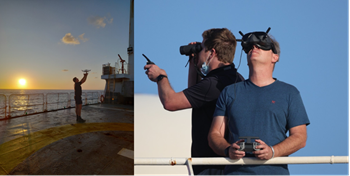Engineering’s Autonomous Operations group (MAO), with the support of the Advanced Mechatronic Technology Centre (AMTC), were invited to participate in the Resilience oceanographic cruise as a drone support team, aboard the Marion Dufresne research and supply vessel.
The cruise, over 33 days in April and May, departed from and returned to Reunion Island and focussed on the study of interactions between ocean physics and biology on a "small scale" (~10km).

The scientists studied oceanic fronts on the edge of eddies (whirlpools) in the Mozambique Channel and on the east coast of South Africa. The Resilience cruise (pictured above) is part of a long term established scientific collaboration between the teams of Mandela Uni’s Prof Mike Roberts and the Institut de Recherche pour le Développement (IRD) in South Africa, which both actively contribute to the cruise organisation and its achievements.
Mandela Uni staff members on the cruise were Prof Mandy Lombard, Chair of Marine Spatial Planning, Prof Lorien Pichegru, Acting Director of the Institute for Coastal and Marine Research (CMR), assisted by Dr Gwenith Penry, Damian Mooney, drone operator and project Manager for the Mandela Uni Autonomous Operations group (MAO), and Jan de Jongh, master’s student in Mechanical Engineering (MAO).
In parallel to the Eddie observations, marine mammals, birds, and pollution observers were invited to gather data while underway. To improve visual detection over long range, airborne drones and a kite-borne surveillance system were brought on board to intercept marine mammals during times where the ship's predetermined path did not allow for close contact.
The drones were equipped with petri dish collectors enabling them to collect mucus samples while above whale blow holes when weather and sea state conditions allowed. The drones were operated from the deck of the ship, often hand-launched and retrieved.

The research team comprised 50 international scientists, led by Jean-François Ternon (Institut de Recherche pour le Développement (IRD) researcher at UMR MARBEC (Joint research unit Marine Biodiversity Exploitation and Conservation).